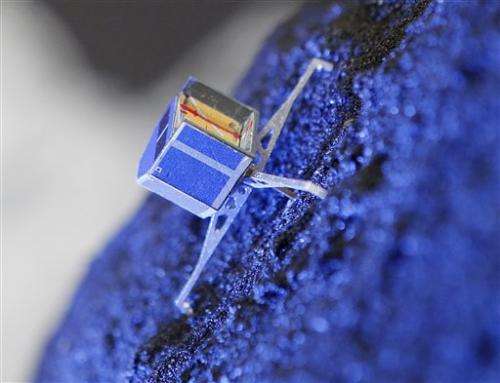November 17, 2014 report
Best of Last Week – Philae lands on a comet, new way to generate electricity and long term impact of marijuana use

(Phys.org)—It was a big week for space science, topping the news of course was a European spacecraft landing on comet 67P/Churyumov-Gerasimenko. The spectacular achievement by the washing-machine sized Philae probe was a cosmic first in many ways and resulted in very good data being sent back to Earth before it went silent due to its batteries dying prematurely. Researchers studying Uranus were kept busy as well, as one team was thrilled by extreme storms spotted in the planet's hazy blue-green atmosphere.
Another team saw some clues revealed about the planets interior—reexamined, decades-old Voyager 2 data offered evidence of the possibility of an unusual feature hiding deep within the planet. Meanwhile, researchers at Arizona State University found that magnetic fields frozen into some meteorite grains were telling a shocking tale of the birth of the solar system. They suggest that shock waves moving through the material surrounding the early sun had a major impact on how the solar system was formed. And another team working with X-ray telescopes found that a black hole may be a neutrino factory—specifically, the black hole thought to be at the center of the Milky Way galaxy. If the findings prove true, it would be the first time that neutrinos have been traced back to a black hole.
In technology news, one team of researchers at the University of Texas announced the development of a lighter, cheaper radio wave device that could transform telecommunications—it's a radio wave circulator that is both smaller and more efficient than those currently in use and could be used to potentially double the amount of useful bandwidth. Meanwhile, another team working at VTT Technical Research Centre in Finland demonstrated a new technique for generating electricity. In unrelated news, two teams of researchers have confirmed what many have suspected: that a healthy diet is good for the kidneys—and it can even help reverse some cases of kidney disease.
And finally, if you're wondering if smoking weed your whole life might be having an impact, a recent study showed marijuana's long-term effects on the brain—like smaller brain parts and increased connectivity between other brain areas. They report that it appears likely that there are different impacts depending on when smoking started and how long it has been used.
© 2014 Phys.org



















